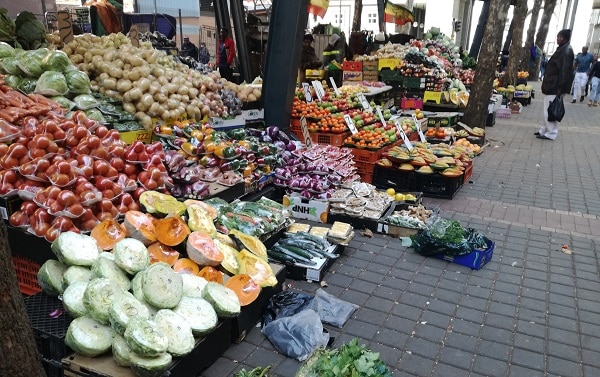
Informal food sector involves “spaza shops, bakkie traders, street traders and hawkers, and is an industry that is worth about R360 billion a year. Image credit: UP website
University of Pretoria (UP) academic Dr Marc Wegerif is calling on the government to provide emergency relief for informal food traders and the establishment of a “social safety net” to mitigate the effects of the COVID-19 lockdown.
Dr Wegerif, a lecturer in the Development Studies Programme in UP’s Department of Anthropology and Archaeology, has conducted research on the informal food trade and assisted in developing a position on the subject for the C19 People’s Coalition, a civil society group that is advocating for a just and equitable response to the pandemic. He discussed his findings at a Food Governance webinar recently hosted by the Department of Science and Technology-National Research Foundation Centre of Excellence in Food Security. The centre is hosted jointly by UP and the University of the Western Cape.
Dr Wegerif explained that the informal food sector involves “spaza shops, bakkie traders, street traders and hawkers, and is an industry that is worth about R360 billion a year”. The informal food economy has been hit hard by the government-imposed national lockdown. “Under normal circumstances, business owners live hand to mouth; the lockdown resulted in them eating their capital. Another consequence is the knock-on effect on small-scale black farmers, landlords and transport owners.”
Government has subsequently amended regulations to allow informal food traders to operate subject to permits being granted by municipalities, yet in some cases, they are being harassed by the police and military. Dr Wegerif said the C19 People’s Coalition is not opposed to the lockdown, but believes that consideration should have been given to the role this sector plays in communities.
He called on government to provide emergency relief to this sector as well as restart packages to enable traders to start operating again. “This is not charity. It is key to kick-starting the economy, getting people back to work and improving access to food.” He also proposed the introduction of a social safety net for those in the informal economy.
“We have seen in this crisis how millions of people have lost their income overnight,” explained Dr Wegerif. “They need some kind of safety net, such as what formal workers get from the Unemployment Insurance Fund. It will be important to work with the informal traders’ associations in planning and implementing these measures. These associations know their members and the challenges they face.”
Informal food traders contribute to food security in South Africa as they supply 30 to 50% of groceries to communities. They are also embedded in local communities, which is in contrast to the formal food sector. “The informal sector contributes to social integration and the inclusion of people who are non-citizens,” Dr Wegerif explained.
According to studies referenced by him, 70% of people in townships and informal settlements buy from informal food traders. These outlets also operate for long hours, and are available when people have time to purchase necessities; they are also flexible when it comes to the quantity of food they sell in order to meet people’s limited budgets. “Some traders get to know customers and provide them with interest-free credit,” says Dr Wegerif. “With these outlets closed due to lockdown, people now have to spend time and taxi fares travelling to more distant formal supermarkets for groceries. This also increases the risk of COVID-19 infection.”
In his own research, Dr Wegerif has found that street traders sell fresh fruit and vegetables at considerably lower prices than supermarkets. The absence of these traders, combined with the loss of income for many, is leading to less fresh produce consumption and will likely lead to increased cases of food and nutrition insecurity.
It is important that these traders are allowed to operate, and government should assist to make this practice safe by providing water and hand sanitisers, as well as by monitoring social distancing where informal traders operate. This can be as safe or safer than the arrangements at supermarkets
Dr Wegerif added that in the long term, town planning and regulations should secure space for informal traders that fits their mode of operating. There should be improved infrastructure, water, sanitation, shelter and storage facilities. “Unfortunately, this important sector has been overlooked in the past and in the initial responses to the COVID-19 crisis. What is needed is a new valuing of the sector and investment in it to maximise the benefits it brings.”
This article was originally published by the University of Pretoria
related Articles
South African cities face hunger and food insecurity as cost of living...
Originally published by the Mail&Guardian. “South Africa’s major cities are home to millions of people facing hunger and food insecurity…
CoE-FS 10th Anniversary Symposium – Governance and policy
Date: Wednesday, 22 May 2024 Time: 10h00 – 12h00 (SAST) Register for Zoom here. Co-chaired by Professor Julian May (CoE-FS…
Meet the grantee: Thato Mokgalagadi
Thato Mokgalagadi, a student currently doing her MSocSci Development Studies degree at CoE-FS co-host institution, the University of Pretoria. Photo:…



